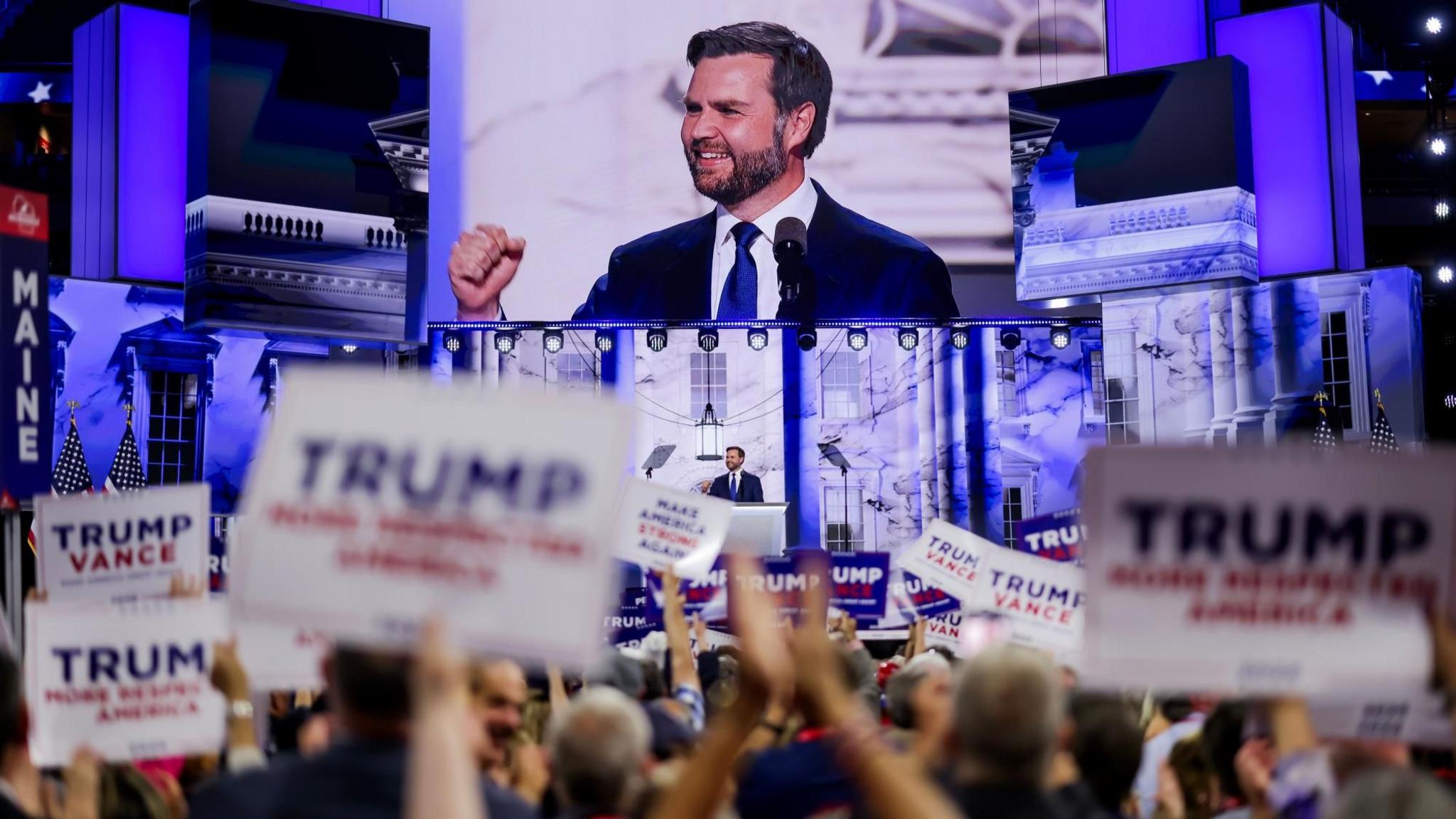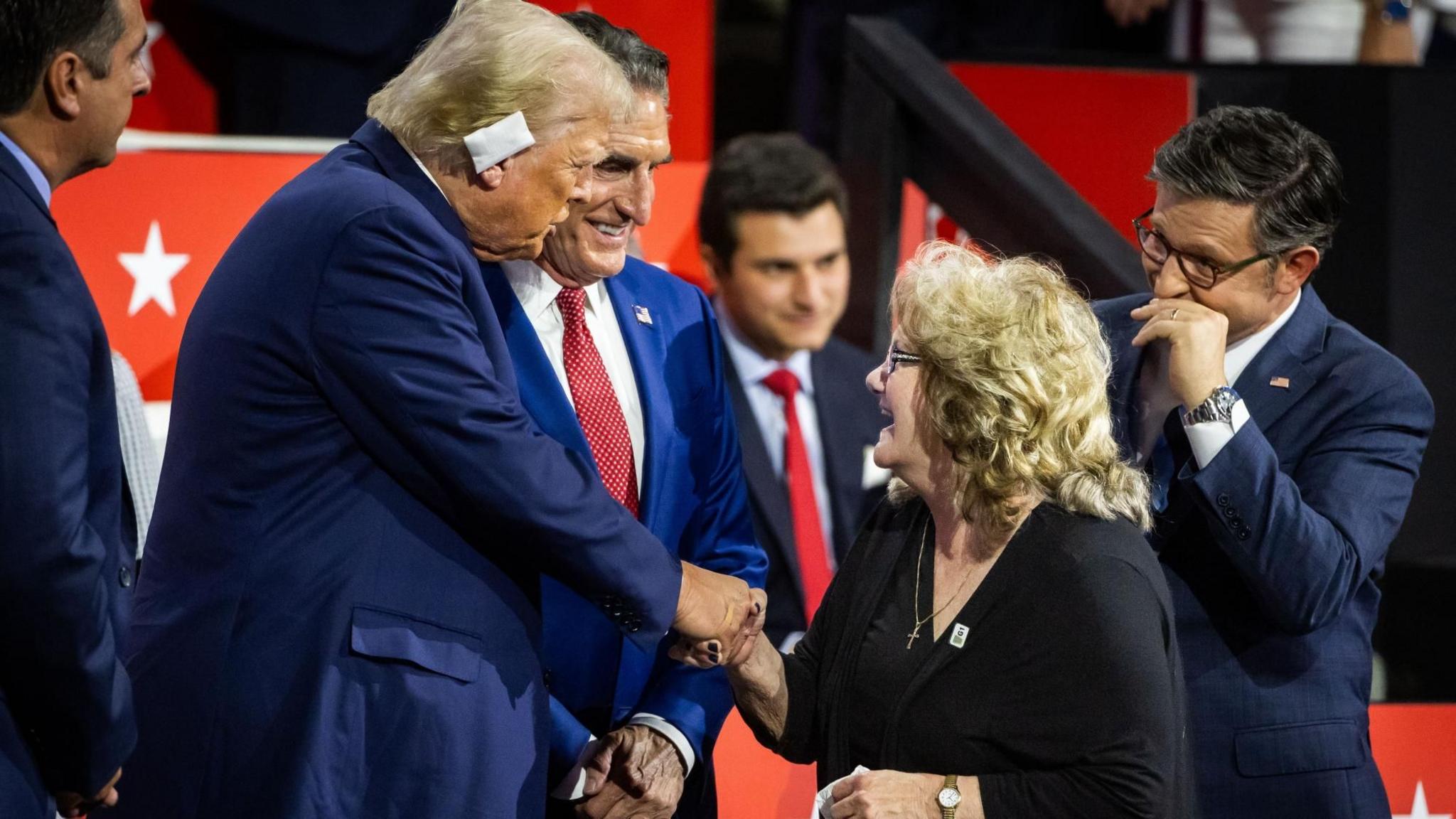Analysis: JD Vance recounts 'hillbilly' roots but shows hard political edge

- Published
JD Vance took the stage on Wednesday night at the Republican national convention and introduced himself to an American public that frankly knows little about him.
The 39-year-old also set the parameters for what could become a more clear and forceful ideological foundation to the populist conservative movement that Donald Trump brought to the White House, sometimes haltingly, in 2016.
The Ohio senator, first elected to public office just two years ago, began by recounting Donald Trump’s brush with death by an assassin’s bullet on Saturday.
He then turned to his own personal story - of a "hillbilly" childhood growing up in a family of limited means while his mother struggled with addiction.
He recounted his service in the US Marines after 9/11, which then helped pay his college tuition.
Some of his speech was lighthearted. As a graduate of the Ohio State University, he exchanged good natured barbs with the delegation from Ohio’s college sport arch-rival, Michigan.
He spoke about his grandmother, whom he called "Mawmaw" – which he noted was a term of endearment in the Appalachian community he hails from. He touted her toughness - recalling that the family had found "19 loaded handguns" in her home after she died - and said she had once warned that she would drive over a drug-dealing youth he was known to spend time with.
Then he pivoted to politics, and Mr Vance’s speech took on a harder edge. He outlined ideas he has spoken about before, but this time, put them in front of a national audience.

Donald Trump shakes the hand of Bev Vance, JD Vance's mother, a former drug addict who received a standing ovation
He railed against what he described as an out-of-touch elite. He blamed Joe Biden for supporting free trade deals and voting for the Iraq War (both of which were also backed by many Republicans).
“We need a leader who's not in the pocket of big business but answers to the working man,” he said.
The former venture capitalist criticised multinational corporations and described a growing wealth gap between “the few with power and comfort” and “the rest of us”.
It’s the kind of rhetoric that might find a comfortable home in the progressive left of the Democratic Party – and has made some business leaders in his own party wary of their new vice-presidential nominee.
Then Mr Vance moved on to a topic that keeps the Trump brand of politics distinct from the populist left.
He warned of the dangers of immigration, saying that undocumented migrants worsened the plight of working-class Americans by competing with them for jobs and limited housing.
He went on to a full-throated defence of American nationalism. He said that America was more than just a good idea, it was a “group of people with a shared history and a common future”.
“It is, in short, a nation,” he said.
Watch: Moments from JD Vance's first speech as VP candidate
Mr Vance, married to the daughter of Indian immigrants, quickly pointed out that the US welcomed “newcomers” – but with a key caveat.
“We allow them on our terms,” he said.
The newly minted vice-presidential running mate concluded with an extended description of his family burial plot on a mountainside in eastern Kentucky, where seven generations of his ancestors are interred.
He said that this kind of generational connection was the embodiment of a homeland that people would fight and die for – and it represented more than an abstraction.
“People don't go and fight and die for abstractions,” he said. “But they will fight for their home.”
Time and time again in his speech, Mr Vance noted his Appalachian ties – through ancestry and history – and how many from the region migrated to work in factories in states like Pennsylvania and Michigan.
Those are the key electoral battlegrounds that could decide the forthcoming presidential election – and part of the reason Trump picked him as his running mate.
But Mr Vance’s selection was also a re-emphasis of the core tenets of Trump’s political movement – on immigration, on trade and on energy policy.
When Donald Trump was president, his biggest wins involved corporate tax cuts and government deregulation. With JD Vance in his White House, however, it means that the next time around – if there is one – his policies could move in a decidedly more populist direction.
At the very least, on Wednesday night, Mr Vance set out just such a path ahead.
Vance was 'personable' - Republicans react to speech